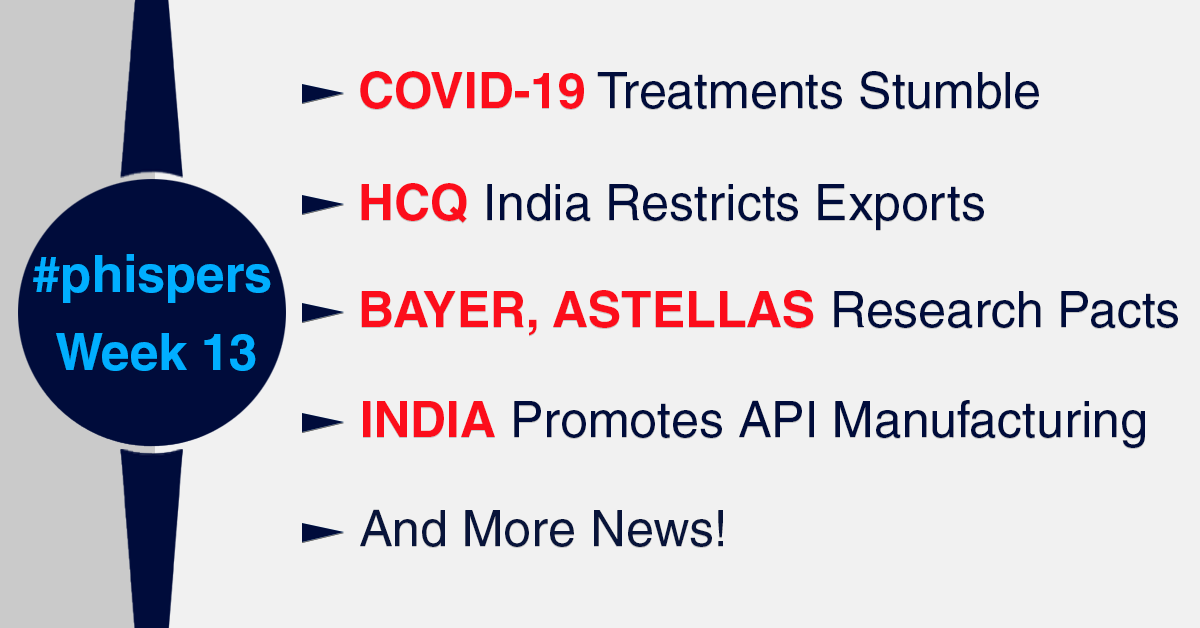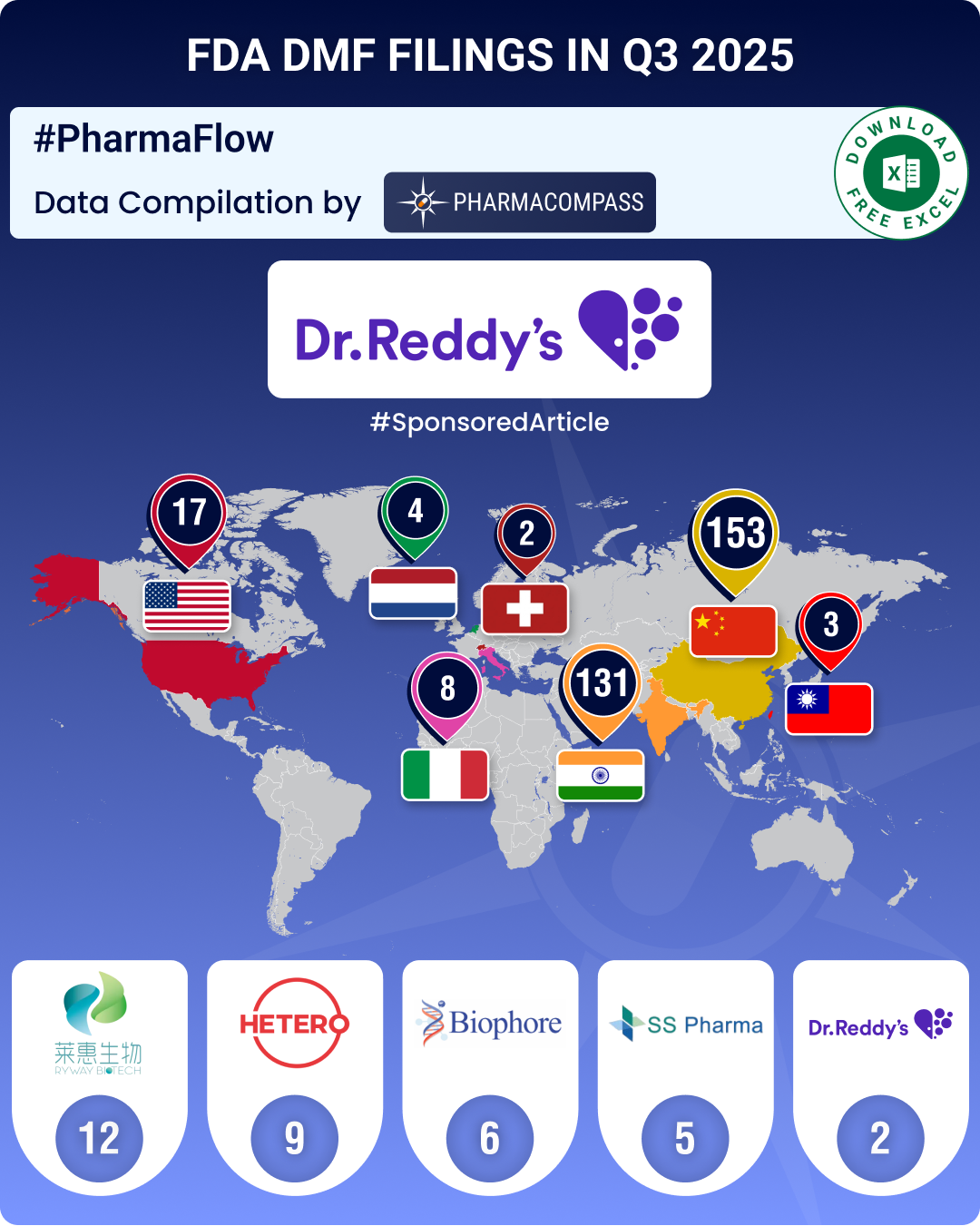
By PharmaCompass
2020-03-26
Impressions: 3134
This week, Phispers has some bad news on the potential treatments for Covid-19.
First, studies have shown limited clinical improvement due to treatments like hydroxychloroquine, lopinavir and ritonavir.
Second, Gilead stopped offering its experimental drug Remdesvir — the treatment found to be “most promising” by WHO — for compassionate use in patients with Covid-19.
Gilead wants to focus on accelerating access of remdesivir for severely ill patients.
Meanwhile, India has restricted the export of hydroxychloroquine, even as FDA lifted its ban on India’s Ipca Labs to secure supplies.
India also approved two schemes to promote domestic manufacturing of APIs, while UK banned parallel export of 80 crucial drugs.
In other, non-Covid news, Bayer and Curadev announced a research collaboration.
The deal seeks to develop new drugs targeting lung, cardiovascular and inflammatory diseases.
Similarly, CytomX Therapeutics has teamed up with Astellas Pharma for a treatment of cancer.
And Novartis published phase 3 data of inclisiran — the late-stage drug it acquired last year through the acquisition of MedCo for US$ 9.7 billion.
Covid-19 treatments — hydroxychloroquine, lopinavir-ritonavir — stumble
In a setback to the world’s efforts to develop antiviral medicines to target the infection caused by the novel coronavirus — Covid-19 — recent clinical studies published in Chinese patients showed limited clinical improvement over standard care.
Earlier this week, PharmaCompass had reviewed the results of the much publicized French study on hydroxychloroquine (HCQ) and questioned the hype which has been generated (read ‘Hydroxychloroquine: Hype versus reality’) to conclude that it maybe too early to term the combo as a game-changer.
In a controlled clinical study, a report published by the Journal of Zhejiang University in China revealed that patients who got treated by hydroxychloroquine didn’t fare any better than those who did not get the medicine.
The study, performed on 30 patients, found that on Day 7, Covid-19 nucleic acid of throat swabs was negative in 13 (86.7 percent) cases in the HCQ group and 14 (93.3 percent) cases in the control group. The median duration from hospitalization to virus nucleic acid negative conservation was 4 (1-9) days in HCQ group, which was comparable to that in the control group (1-4) days. The results of the study weren’t statistically significant.
There was also a report from the United States of a man who died after ingesting chloroquine phosphate. He believed it would protect him from becoming infected with the coronavirus. The man’s wife also ingested the substance and was placed under critical care.
In another disappointment, a randomized, controlled trial of AbbVie’s treatment Kaletra (lopinavir-ritonavir) conducted on 199 patients found that patients who were given lopinavir-ritonavir did not have clinical improvement different from that of patients assigned to standard care. The median time to clinical improvement was 15 days in the lopinavir-ritonavir group, as compared with 16 days in the standard-care group.
Standard care comprised, as necessary, supplemental oxygen, non-invasive and invasive ventilation, antibiotic agents, vasopressor support, renal-replacement therapy, and extracorporeal membrane oxygenation (ECMO).
This trial was conducted at the Jin Yin-Tan Hospital, Wuhan, Hubei Province, China.
India restricts HCQ exports even as FDA
lifts ban on India’s Ipca to secure supplies
Following the rising interest in hydroxychloroquine (HCQ) as a potential treatment of Covid-19, a national task force in India recommended the use of the molecule as a preventive medication for people at higher risk of contracting the virus. The directive lists that HCQ should be given to asymptomatic healthcare workers involved in the care of suspected or confirmed cases of Covid-19 and asymptomatic household contacts of laboratory confirmed cases.
In a surprise move, the US Food and Drug Administration (FDA) made an exception to the four-year old ban placed on India’s Ipca Labs, one of the major manufacturers of chloroquine and hydroxychloroquine, to sell their drugs in the United States. This exception was made as pharmacies in the US were running out of HCQ.
More recently, during an August 2019 inspection, the FDA had observed “a cascade of failure” in Ipca’s quality unit.
Ipca informed the bourses that due to the shortage implications and/or medical necessity of certain drugs and finished products, the import alert for the company’s hydroxychloroquine sulphate and chloroquine phosphate APIs and hydroxychloroquine sulphate tablets had been partially lifted.
The exemptions made by the FDA were for:
- Hydroxychloroquine sulphate and chloroquine phosphate APIs produced at Ipca’s API manufacturing unit situated at Ratlam (Madhya Pradesh); and
- Hydroxychloroquine sulphate tablets produced at the Ipca's formulations manufacturing units situated at SEZ Indore, Pithampur (Madhya Pradesh) and Piparia (Silvassa).
However, within less than a week of Ipca’s announcement, the Indian government issued a directive which prohibits the export of HCQ API and formulations made from HCQ. The directive does, however, offer exemptions to exports from special economic zones/export-oriented units and in cases where export is made to fulfill an export obligation under any advance license issued on or before the date of the notification.
Gilead
stops offering remdesivir to Covid-19 patients for compassionate use
Gilead Science’s experimental antiviral medicine remdesivir has been hailed as the “most promising” treatment against the ongoing Covid-19 outbreak by the World Health Organization (WHO). “There’s only one drug right now that we think may have real efficacy. And that’s remdesivir,” Bruce Aylward, head of WHO’s Covid-19 mission in China, had said last month.
Expectedly, this led to an “exponential increase” in requests to administer remdesivir under compassionate use.
Gilead said in a statement that it is working to rapidly assess the safety and efficacy of remdesivir as a potential treatment for Covid-19 through multiple ongoing clinical trials. “Enrollment in clinical trials is the primary way to access remdesivir to generate critical data that inform the appropriate use of this investigational medicine,” the company said.
The sudden spike of Covid-19 cases in Europe and the US “flooded an emergency treatment access system that was set up for very limited access to investigational medicines and never intended for use in response to a pandemic,” Gilead said.
Therefore, the company has temporarily stopped granting patients emergency access to remdesivir under compassionate use, the company said. However, Gilead will make exceptions to pregnant women and children under 18 with severe Covid-19.
By temporarily stopping access to the drug for compassionate use, the company hopes to accelerate access to remdesivir for severely ill patients and enable the collection of data from all participating patients. “These programs are currently under rapid development in conjunction with national regulatory authorities worldwide, and may vary by region based on local laws and regulations,” it added.
The US Food and Drug Administration (FDA) said it had allowed about 250 patients access to remdesivir through the compassionate use program.
Chinese scientists have already initiated two clinical trials of remdesivir in mild to moderate and severe Covid-19 patients, with early results expected in April.
Bayer-Curadev, Astellas-CytomX announce
research pacts
This week, German drugmaker Bayer and Curadev Private Limited, a drug discovery company based in India, announced a research collaboration and license agreement for Curadev’s Stimulator of Interferon Genes (STING) antagonist program. The deal seeks to develop new drugs targeting lung, cardiovascular and inflammatory diseases.
As part of the agreement, Bayer will gain exclusive access to novel molecules from Curadev that are designed to inhibit the STING pathway. STING antagonists offer tremendous potential for new treatments as STING is known to play a role in activating the innate immune system in auto-inflammatory diseases.
The companies will collaborate to optimize and advance these molecules, as well as others generated during the collaboration, into clinical development.
Under the terms of the agreement, Curadev will receive an upfront payment. In addition, Curadev will receive research funding during the research term and might be eligible for pre-clinical, clinical and sales milestones of (potentially) over €250 million (US$ 270 million) as well as royalties of single digit percentages of net sales.
Meanwhile, CytomX Therapeutics has teamed up with Astellas Pharma to focus on the discovery, research, development and commercialization of novel T-cell engaging bispecific antibodies targeting CD3 and tumor cell surface antigens for the treatment of cancer. The two companies will utilize CytomX’s Probody therapeutic technology platform, as well as its proprietary bispecific formats and CD3 modules.
Under the agreement, CytomX and Astellas will collaborate on several initial programs. CytomX will lead research and discovery activities, up to clinical candidate selection, that will be funded by Astellas. Astellas will make an upfront cash payment of US$ 80 million to CytomX with CytomX eligible to receive future preclinical, clinical and commercial milestones of over US$ 1.6 billion. CytomX is also eligible to receive tiered royalties on global net sales that range from high-single digits to mid-teens.
“This collaboration with Astellas leverages CytomX’s deep expertise in targeting multiple antibody modalities to the tumor microenvironment,” said Sean McCarthy, President, Chief Executive Officer and Chairman of CytomX.
India approves two schemes
to promote domestic manufacturing of APIs
Back in 2015, a year after India’s prime minister Narendra Modi had assumed power, there was a lot of talk about the government coming out with strategies to improve the country’s bulk drug manufacturing capacity in order to reduce dependence on China for the import of bulk drugs.
In an article published in The Economic Times, a government official was quoted as saying that India is importing 70-80 per cent bulk drugs from China, and that the government plans to come out with strategies that will be part of the proposed bulk drug pharma policy.
Over the next five years, those plans never saw the light of the day until the novel coronavirus sent jitters across the global pharmaceutical supply chain.
In February, India’s union minister of chemicals and fertilizers had given an assurance to the pharmaceutical industry of reforms to make the country self-sufficient in bulk drugs. Earlier this month, an industry body in India — the Confederation of Indian Industry — had also said that the coronavirus outbreak makes a compelling case for the government to declare APIs as a strategic sector as most inputs are imported.
Finally, the Indian government has approved two schemes to promote the manufacturing of active pharmaceutical ingredients (APIs) in the country. The first scheme — Promotion of Bulk Drug Parks — seeks to develop three mega bulk drug parks in India in partnership with states.
The Central government will give grants-in-aid to states with a maximum limit of US$ 131 million (INR 10 billion) per bulk drug park. These bulk drug parks will have common facilities such as solvent recovery plant, distillation plant, power and steam units, common effluent treatment plant etc. The country will be spending US$ 393.37 million over the next five years for this scheme.
The second scheme — Production Linked Incentive (PLI) Scheme — seeks to promote domestic manufacturing of critical key starting materials (KSMs) or drug intermediates and APIs in India with financial implications of US$ 911 million (INR 69.4 billion) for the next eight years.
Under this scheme, financial incentive will be given to manufacturers of 53 critical bulk drugs on their incremental sales over the base year (2019-20) for a period of six years. Out of the 53 identified bulk drugs, 26 are fermentation-based bulk drugs and 27 are chemical synthesis-based bulk drugs.
Meanwhile, India has imposed a 21-day lockdown from Wednesday, pushing pharma companies in a panic mode. “The ban on public transportation is making it difficult for laborers to reach manufacturing plants. All the ancillary goods required for medicine production are getting detained or are shut. Printers that manufacture packaging for medicines are shut, vehicles of suppliers of packaging materials for medicines are getting detained,” a report published in The Economic Times said.
According to the report, Ipca Labs was supposed to deliver 500,000 blisters of hydroxyqcholorine (HCQ) tablets to the Indian government by March 24, but had to wait two days to get permission to airlift its tablets from Siliguri in West Bengal. The Indian Council of Medical Research (ICMR) has recommended the use of HCQ for high risk healthcare workers dealing with Covid-19 patients.
UK bans parallel export of 80 crucial drugs: The United Kingdom has banned the parallel export of 80 crucial medicines including adrenaline, insulin, paracetamol and morphine to protect supplies during the Covid-19 outbreak.
The government describes parallel exporting as the purchase of medicines meant for UK patients but sold at a higher price in another country, potentially causing or worsening supply problems. Companies found to be parallel exporting could face tough action from the country’s drug regulator, including the removal of their trading license, the department of health said.
Novartis
posts key clinical data on US$ 9.7 billion late-stage heart drug
In November 2019, Novartis had bought New Jersey-headquartered The Medicines Company (MedCo) for US$ 9.7 billion. The buyout was to give the Swiss drugmaker a late-stage cholesterol drug named inclisiran.
Inclisiran is a small, interfering RNA (siRNA) drug that works by blocking the synthesis of PCSK9 (an enzyme) in the liver rather than targeting the protein itself. This allows more receptors on the liver cell surface to capture LDL cholesterol to break down. By lowering LDL levels (popularly known as the ‘bad’ cholesterol), the likelihood of major cardiac events decreases.
Last week, Novartis published the phase 3 data it hopes will secure approval of inclisiran. The trials linked the siRNA therapy to sharp declines in levels of LDL cholesterol.
The New England Journal of Medicine published results of ORION-9 and an analysis of both the ORION-10 and ORION-11 trials. All the three phase 3 trials were used in support of the New Drug Application (NDA) filed for inclisiran in December 2019.
“Inclisiran and its twice-yearly dosing schedule in three large trials consistently delivered potent and sustained cholesterol-lowering and was generally well tolerated,” said Kausik Ray, ORION-11 principal investigator and Deputy Director of Imperial Clinical Trials Unit at Imperial College, London.
“These data provide support for this groundbreaking approach to reducing LDL-C in patients who are not achieving LDL-C treatment goals with the current standard of care,” Ray added.
The PharmaCompass Newsletter – Sign Up, Stay Ahead
Feedback, help us to improve. Click here
Image Credit : #Phisper Infographic by SCORR MARKETING & PharmaCompass is licensed under CC BY 2.0
“ The article is based on the information available in public and which the author believes to be true. The author is not disseminating any information, which the author believes or knows, is confidential or in conflict with the privacy of any person. The views expressed or information supplied through this article is mere opinion and observation of the author. The author does not intend to defame, insult or, cause loss or damage to anyone, in any manner, through this article.”








